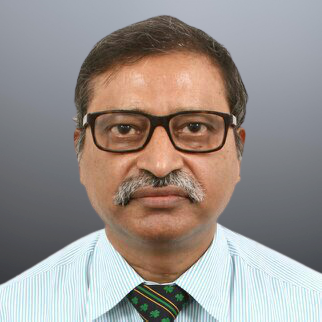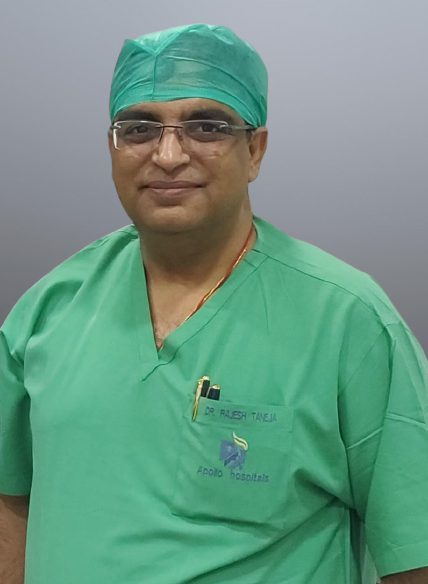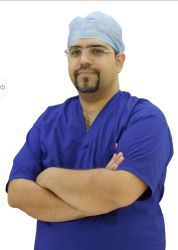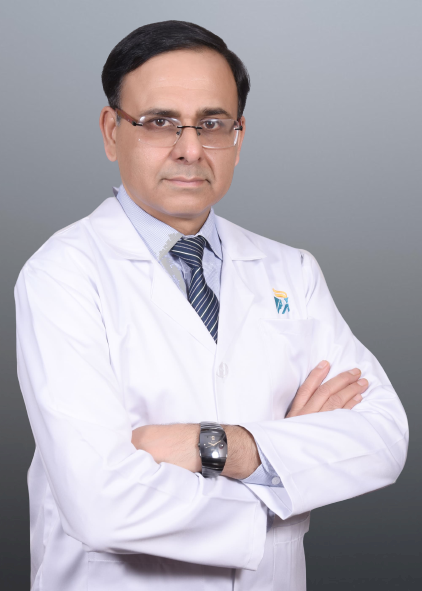Search Result: 13

Dr Ajit Saxena
MBBS, MS, DU
Registration No
366
Language
English, हिंदी

30 years experience overall

Sarita Vihar , Delhi
MON | THU, SAT(02:00 PM-03:00 PM | 12:00 PM-01:00 PM)

Dr Anshuman Agarwal
MBBS, MS, MCh
Registration No
479639
Language
English, हिंदी, தமிழ்

21 years experience overall

Sarita Vihar & Nehru Enclave , Delhi
MON- SAT(11:00 AM-04:00 PM)

Dr Ashish Sabharwal
MBBS from R.G. Kar Medical College, Calcutta. (1994-1999) M.S. (General Surgery) from BLDEA Medical College, Karnataka University (2001-2004) and DNB (Urology) from Apollo Hospital, New Delhi (2005-2008) Advanced Fellowship in Endourology and Robotic Surgery, Jackson Health System, Miami, Florida, USA (June 2008 to May 2011) HIFU for Prostate Cancer Doctors Hospital, Nassau, Bahamas [April 23& 24, 2010]
Registration No
1120945
Language
English, हिंदी

20 years experience overall

Sarita Vihar , Delhi
MON | TUE | WED | THU | FRI | SAT(04:00 PM-06:00 PM | 12:00 PM-04:00 PM | 10:00 AM-12:00 PM | 12:00 PM-04:00 PM | 04:00 PM-06:00 PM | 10:00 AM-12:00 PM)

Dr Ayush Khetarpal
MBBS, MS (General Surgery), MCh (Urology)
Registration No
4642687
Language
English, ગુજરાતી, हिंदी, ਪੰਜਾਬੀ, اردو

7 years experience overall

Karol Bagh , Delhi
MON, WED(01:00 PM-03:00 PM)

Dr Narasimhan Subramanian
MBBS, MS (Surgery), FRCS (G), FRCS (ED), Dip. Urology (Lon)
Registration No
378
Language
English, বাংলা, हिंदी, தமிழ்

34 years experience overall

Sarita Vihar , Delhi
WED(11:00 AM-11:30 AM)

Dr Rajesh Taneja
MBBS, MS(General Surgery), MCh Urology
Registration No
250631
Language
English, हिंदी, ਪੰਜਾਬੀ, اردو

27 years experience overall

Sarita Vihar , Delhi
MON, THU- SAT(11:00 AM-01:00 PM, 02:00 PM-04:00 PM)

Dr S K Pal
MBBS, MS, MCh
Registration No
1310335
Language
English, हिंदी

30 years experience overall

Nehru Enclave , Delhi
TUE, THU(01:00 PM-02:00 PM)

Dr Suresh Kr Rawat
MBBS, MS, MCH, DNB
Registration No
392
Language
English, हिंदी

36 years experience overall

Sarita Vihar , Delhi
MON- SAT(12:00 PM-04:00 PM)

Dr Tanuj Paul Bhatia
MBBS MS DNB
Registration No
6346613
Language
English, हिंदी

15 years experience overall

Nehru Enclave , Delhi
WED(08:00 AM-09:30 AM)

Dr Vijayant Govind Gupta
MBBS MS MCH
Registration No
5216361
Language
English

12 years experience overall

Karol Bagh , Delhi
TUE, FRI(10:00 AM-01:00 PM)

Dr Vipin Arora
MBBS, MS, FRCS, DU, FRCS
Registration No
364
Language
English, हिंदी, ਪੰਜਾਬੀ

33 years experience overall

Sarita Vihar , Delhi
MON, TUE, SAT | WED- FRI(08:00 AM-02:00 PM | 02:00 PM-08:00 PM)

Dr Ankit Tyagi
MBBS M.S DrNB
Registration No
6444376
Language
English

5 years experience overall

Pusaroad , Delhi
MON- SAT(12:00 PM-06:00 PM)
Frequently Asked Questions for Nephrectomy in Delhi
You can live a normal and healthy life with just one kidney. The remaining kidney compensates for the loss, and as long as it functions well, there are usually no adverse effects on your overall health or lifespan. However, regular check-ups are recommended to monitor kidney function.
In a nephrectomy, either a portion (partial nephrectomy) or the entire kidney (radical nephrectomy) is removed. The adjacent structures like the adrenal gland and nearby lymph nodes may also be removed if necessary.
The duration of a nephrectomy procedure can range from 3 to 4 hours, depending on the complexity of the case and the surgical approach used. Minimally invasive techniques may take less time compared to traditional open surgery.
Yes, nephrectomy is considered major surgery. It involves the removal of all or part of a kidney, which requires careful planning, specialised surgical techniques, and post-operative monitoring to ensure a successful outcome.
The most common reason for nephrectomy is kidney cancer. Other reasons include severe kidney disease (such as end-stage renal disease), non-functioning or damaged kidneys, and kidney transplantation.
Yes, kidney removal, also known as nephrectomy, is a major surgery. It carries certain risks, such as bleeding, infection, damage to surrounding organs, and complications related to anaesthesia. However, with proper preoperative evaluation and skilled surgical techniques, risks can be minimised.
Eligibility for nephrectomy depends on the specific medical condition and the recommendation of the doctor. Generally, individuals with kidney diseases, kidney cancer, or those who wish to donate a kidney for transplantation may be considered for a nephrectomy.
There are many hospitals that specialise in nephrectomy procedures. It is best to choose one with experienced surgeons, state-of-the-art facilities, and a good track record in performing kidney surgeries.
The duration of nephrectomy depends on various factors such as the complexity of the case and whether it is performed using traditional open surgery or minimally invasive techniques. On average, a nephrectomy can take anywhere from 3 to 4 hours.
After nephrectomy, you may need to take pain medication, rest well, and schedule follow-up appointments with your surgeon. It is important to follow any dietary restrictions and physical activity limitations provided by the doctor to ensure a smooth recovery.
Preparation for nephrectomy may include fasting before the surgery, stopping certain medications that increase bleeding risk, and undergoing preoperative tests such as blood work and imaging studies. Your doctor will give specific instructions tailored to your situation.
The recovery time for nephrectomy varies depending on the extent of the surgery and your overall health. In most cases, patients stay in the hospital for a few days and take 6 to 12 weeks to fully recover.
The success rate of nephrectomy depends on various factors such as your overall health condition, the reason for the procedure and the surgeon’s expertise. Generally, nephrectomy has a high success rate with rare chances of complications.
To find the best doctors for nephrectomy, you can ask for recommendations from your primary care physician, consult with friends or family members who have had similar procedures, or research online for doctors specialising in urology or transplant surgery.
Nephrectomies are typically performed by qualified urologists or transplant surgeons who specialise in kidney surgeries. They have expertise in performing this procedure and managing any complications that may arise.
A doctor who performs a nephrectomy is usually a urologist or a transplant surgeon. They have completed medical school and a training program in urology or minimally invasive surgery. They may also have additional specialised training in kidney transplant surgeries.
Nephrectomy is a surgical procedure that is performed to remove one or both kidneys. It is done by nephrectomy specialists to treat kidney diseases or kidney cancer or to conduct kidney transplantation.
Related Procedures in Delhi
Related Treatments in Delhi
Other Specialities in Delhi
- Best Urologist in Delhi
- Best Pulmonologist in Delhi
- Best General Physician in Delhi
- Best Endocrinologist in Delhi
- Best Cardiologist in Delhi
- Best Oncologist in Delhi
- Best Radiologist in Delhi
- Best Orthopedics in Delhi
- Best Hepatologist in Delhi
- Best Gynecologist in Delhi
- Best Dermatologist in Delhi
- Best Gastroenterologist in Delhi
- Best Psychologist in Delhi
- Best Ent Specialist in Delhi
- Best Nephrologist in Delhi
- Best Rheumatologist in Delhi
- Best Diabetologist in Delhi
- Best Psychiatrist in Delhi
- Best Neonatologist in Delhi
- Best Dentist in Delhi
- Best Dietitian in Delhi
- Best Haematologist in Delhi
- Best Pediatrics in Delhi
- Best General Surgeon in Delhi
Top Hospitals in India
- Hospitals in Ahmedabad
- Hospitals in Bangalore
- Hospitals in Bhubaneswar
- Hospitals in Bilaspur
- Hospitals in Chennai
- Hospitals in Delhi
- Hospitals in Guwahati
- Hospitals in Hyderabad
- Hospitals in Indore
- Hospitals in Kolkata
- Hospitals in Madurai
- Hospitals in Mumbai
- Hospitals in Mysore
- Hospitals in Nashik
- Hospitals in Noida
- Hospitals in Visakhapatnam
- Hospitals in Lucknow
- Hospitals in Bhopal
- Hospitals in Karur
- Hospitals in Kochi
- Hospitals in Nellore
- Hospitals in Trichy
- Hospitals in Kakinada
© Copyright 2024. Apollo Hospitals Group. All Rights Reserved.
 +91 8069991061
Book Appointment
+91 8069991061
Book Appointment






 Call Now
Call Now













